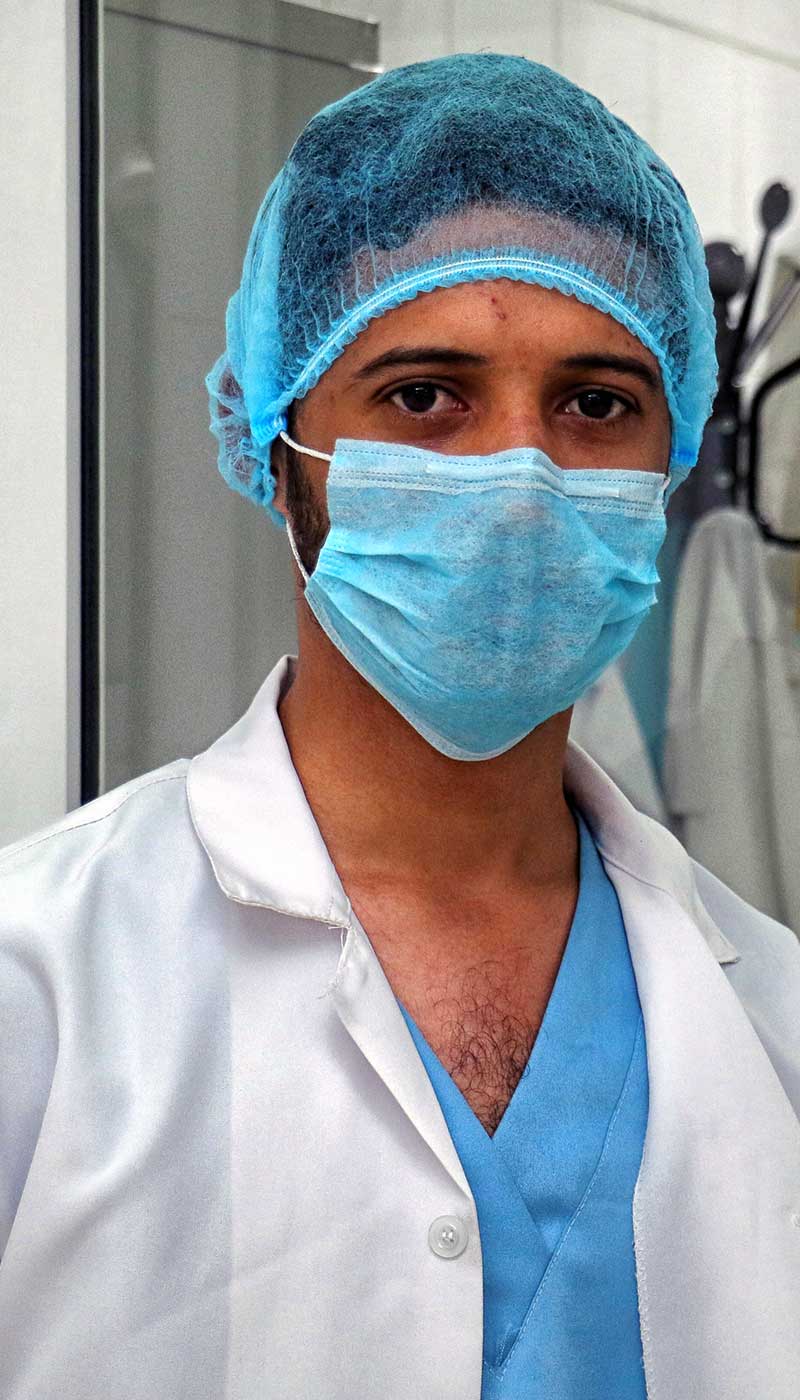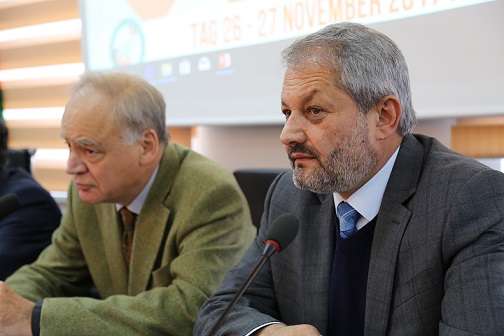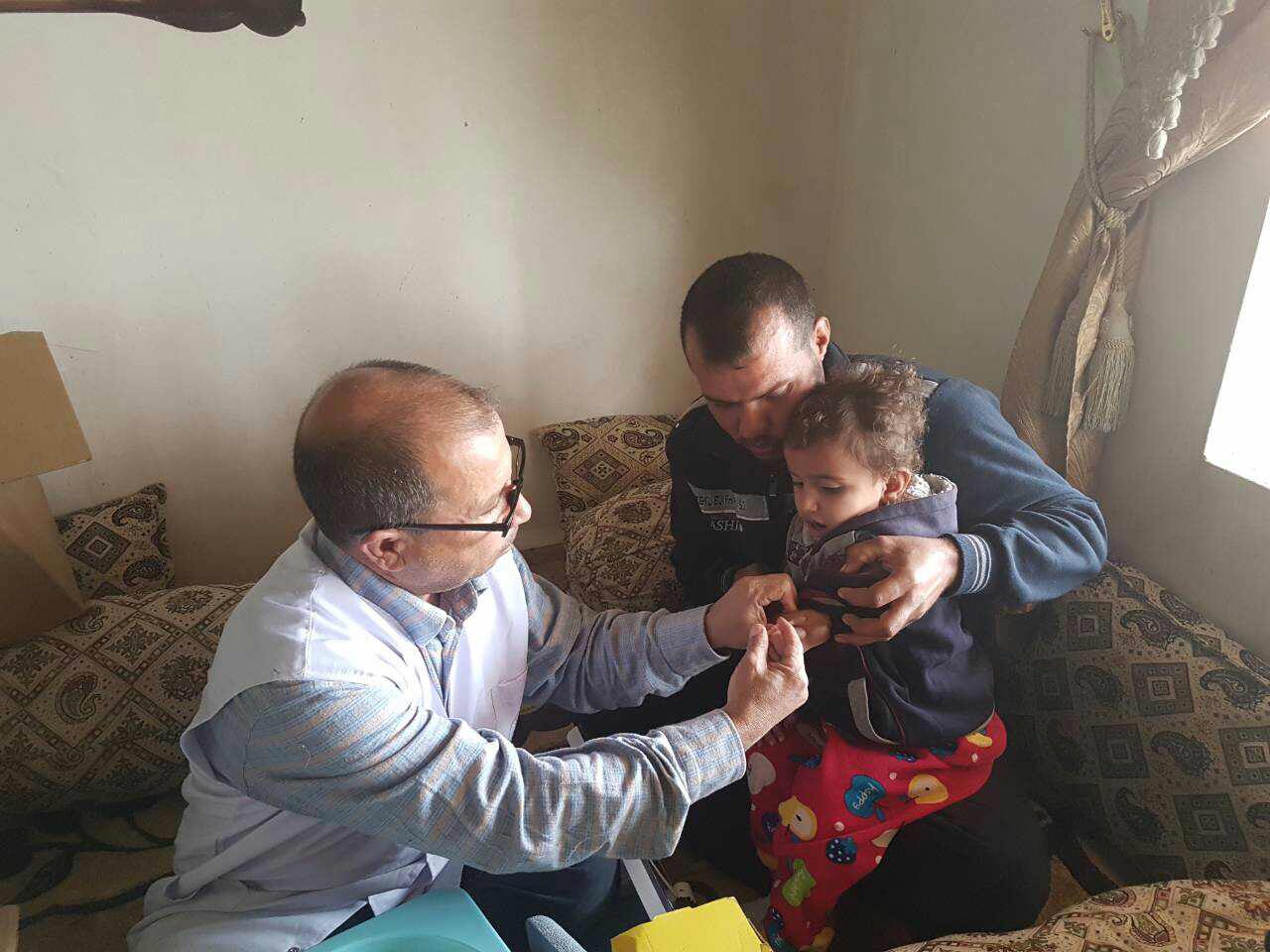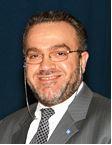WHO concerned about suspected chemical attacks in Syria
WHO is deeply alarmed by reports of the suspected use of toxic chemicals in Douma city, East Ghouta. According to reports from Health Cluster partners, during the shelling of Douma on Saturday, an estimated 500 patients presented to health facilities exhibiting signs and symptoms consistent with exposure to toxic chemicals. In particular, there were signs of severe irritation of mucous membranes, respiratory failure and disruption to central nervous systems of those exposed.
Note verbale documents

Extensive activities were undertaken to strengthen countries’ preparedness for emergencies. A joint external evaluation (JEE) was conducted in Iraq to assess the country’s public health capacities to deal with all hazards under the International Health Regulations (2005). This brings to 18 the number of countries in the Region that have undergone JEEs, with evaluations in the Islamic Republic of Iran, Palestine, the Syrian Arab Republic and Yemen set to complete the tally.
JEEs provide the basis for each country to develop a national action plan for health security (NAPHS) tailored to its specific needs. As part of follow-up work in 2019, workshops were organized by WHO and attended by representatives of public institutions and partner organizations, with participants teaming up to across 19 technical areas of the IHR to address the recommendations that came out of previous JEEs. Djibouti, Egypt, Tunisia and the United Arab Emirates developed their NAPHS.
In addition to this support for individual countries, cross-border and regional preparedness were important areas of focus. WHO collaborated with country offices of the Food and Agriculture Organization of the United Nations and national ministries of public health, animal health and environment to conduct tripartite joint risk assessments for Afghanistan and Pakistan. Staff from national and subnational offices practiced shared health threats at the human–animal–environment interface using a “One Health” approach.
As part of ongoing efforts to support countries in maintaining IHR core capacities at points of entry, WHO collaborated with the United States Centers for Disease Control and the International Organization for Migration to develop a new Handbook for public health capacity building and cross-border collaboration at ground crossings. This global resource was pilot tested through a comprehensive three-day programme of discussions in Beirut, Lebanon, with national IHR focal points, senior officials working directly with public health issues at ground crossings, participants from relevant sectors, and WHO’s sister UN agencies.
Further action on cross-border security included training for personnel from Bahrain, Saudi Arabia and United Arab Emirates on public health capacity-building and cross border collaboration at ground crossings, and a review of ground crossings in Egypt to ensure preparedness following a Rift Valley fever outbreak in Sudan.
At the end of the year, the eighth regional stakeholders meeting brought together more than 140 participants from Member States to review the implementation of the IHR. The meeting provided a platform for the introduction of several new tools and innovations to support IHR implementation, including training packages and tools for NAPHS prioritization, monitoring and evaluation. Recommendations addressed enhancing multisectoral collaboration, determining priority areas, increasing capacity-building activities and continuing knowledge exchange between countries, with WHO reaffirming its commitment to provide ongoing technical support.
Key outcomes of the meeting will feed into the first health security diplomacy meeting, set to take place in 2020, which will provide a high-level forum for continuing multisectoral collaboration and coordination for IHR implementation.
Technical advisory commends progress made in polio eradication in Afghanistan
Kabul, 29 November 2017
The Technical Advisory Group on polio eradication (TAG) met in Kabul, Afghanistan 26th and 27th November 2017 to review the progress and challenges in polio eradication efforts and provide recommendations for achieving polio free status in Afghanistan.
The meeting was attended by Minister for Public Health, Dr. Ferozuddin Feroz, the Deputy Special Representative of the United Nations Secretary General Toby Lanzer, Senior Advisor to Minister of Public Health Dr. Hedayatullah Stanikzai, Representative from Office of Presidential focal point for polio, WHO and UNICEF representatives in Afghanistan, representative from regional offices and headquarters of WHO and UNICEF, members of the Afghanistan Polio Eradication Initiative (PEI) team from national and regional levels as well as representatives from donor agencies and the Pakistan National Emergency Operations Centre (EOC).
 Minister for Public Health, Dr. Ferozuddin Feroz attended the TAG meeting in Kabul
Minister for Public Health, Dr. Ferozuddin Feroz attended the TAG meeting in Kabul
WHO delivers much needed medical supplies to underserved areas in southern Libya
بتمويل من الاتحاد الأوروبي وصندوق الإغاثة المركزي للطوارئ: منظمة الصحة في ليبيا تصل باللوازم الطبية الضرورية للمناطق المحرومة من الخدمات في الجنوب

6 كانون الأول/ ديسمبر 2017، تونس، طرابلس--نجح مكتب منظمة الصحة العالمية في ليبيا في الوصول بالإمدادات الطبية التي تمس الحاجة إليها إلى مستودع الإمدادات الطبية بفزان لتلبية الاحتياجات الصحية العاجلة للآلاف من سكان المناطق الجنوبية المحرومين من الخدمات الصحية الملائمة. ويتم حالياً توزيع تلك الإمدادات على المستشفيات والمراكز الطبية في الجنوب والتي تم تمويلها بدعم قدمته المعونة الإنسانية والحماية المدنية التابعة للاتحاد الأوروبي (إيكو) وصندوق الإغاثة المركزي للطوارئ (سيرف).
تشتمل الإمدادات على 10 حزم طبية من النوع بي المعدة للمعالجة أكثر من ألف إصابة متوسطة إلى شديدة، وثلاثة حزم طبية لمعالجة الأمراض غير السارية كل منها توفر إمدادات أساسية لمعالجة المصابين بالأمراض غير السارية مثل الأدوية اللازمة لمعالجة مرضى القلب والإنسولين ولوازم قياس مستوى السكري في الدم وبخاخ موسع الشعب الهوائية لمعالجة الربو. وقد أعدت كل حزمة طبية بحيث تكفي 30 ألف شخص لمدة حوالي ثلاثة أشهر، فضلاً عن 12 صندوقاً من موسع الشعب الهوائية لمعالجة أكثر من 3600 حالة. ويتم توزيع هذه الإمدادات بناءً على الحتياجات العاجلة في الجنوب الليبي.
علاوة على ذلك، تم توزيع 11 من أجهزة التنفس الاصطناعي من قبل مكتب منظمة الصحة العالمية في ليبيا على مستشفى تراغين ومركز سبها الطبي ومركز سبها للسرطان ومستشفى مرزق وكلها في مناطق تعد الأكثر تعرضاً للمخاطر والأقل تمتعاً بالخدمات الطبية في مناطق الجنوب الليبي.
ومن شأن توفير أجهزة التنفس الاصطناعي أن ينقذ آلاف الأرواح من خلال تقوية نظام التنفس الطبيعي في وحدات الرعاية المركزة.
وبهذه المناسبة تجدد منظمة الصحة العالمية التزامها الإنساني المتواصل ودعمها للقطاع الصحي في مختلف أنحاء ليبيا. كما تعرب عن شكرها العميق لكل من المعونة الإنسانية والحماية المدنية التابعة للاتحاد الأوروبي (إيكو) وصندوق الإغاثة المركزي للطوارئ (سيرف) على ألتزامهما بمواصلة توفير الدعم وتلبية الاحتياجات الصحية الإنسانية في ليبيا.
------
لمزيد من المعلومات:
الدكتور سيد جعفر حسين
ممثل منظمة الصحة العالمية ورئيس بعثتها في ليبيا
إيميل:
Lifesaving mobile health teams reach people in newly liberated areas of Hawiija, Iraq
For more than three years, the people of Hawiija district in Kirkuk Governorate, Iraq, were cut off from lifesaving health care and immunization services, leaving many children susceptible to vaccine-preventable diseases. “For years, I worried that my children may contract polio and measles or die,” said Hadija, a 32-year-old mother of three children.
In September 2017, the district became accessible following military operations launched by the Government of Iraq. WHO, together with Kirkuk Directorate of Health, immediately deployed mobile medical teams to provide immunization services, and health care for people suffering from trauma injuries or chronic disease conditions.
together with Kirkuk Directorate of Health, immediately deployed mobile medical teams to provide immunization services, and health care for people suffering from trauma injuries or chronic disease conditions.
Five mobile medical teams were deployed to Khan, Tal Ali, Abbassi, Masanaa, Al Zab and Ryadh areas. Since then, from mid-September to 15 November 2017, more than 10000 people in Hawiija district have benefited from WHO’s support, including 1563 children vaccinated against childhood immunizable diseases.
Although these newly accessible areas are still security compromised, WHO saw urgency in delivering health care to thousands of people that had been cut off from aid for years, and whose health was being compromised day by day. Five main health facilities have been partially or completely damaged, in addition to Hawija general hospital. Currently, only the Kirkuk Directorate of Health and WHO-supported frontline health teams are delivering immunization services in these areas.
Among the beneficiaries is Hadija, who brought two of her children to the mobile teams for vaccination. “I believe that vaccination prevents many childhood diseases and can save my children. I take this seriously and it has always been a top priority when it comes to the health of my children,” she said.
“Being cut off from regular health services worried me. I thought of my children and how they may become disabled or die. Now we have health teams that move around our village to ensure that not only children, but everyone has access to health care,” added Hadijah.
The WHO-supported mobile teams deliver a comprehensive package of lifesavi
ng health services that include vaccination, medical consultations,

medicines, referrals, health promotion and treatment for chronic conditions. In addition, the teams conduct water quality monitoring, and distribution of chlorine tablets at household levels.
Additional 30 mobile medical teams will be deployed to Hawiija on 3 December 2018 to vaccinate children during an upcomingimmunization campaign.
To date in 2017, financial support from European Union Humanitarian Aid (ECHO), the Office of United States Foreign Disaster Assistance (USAID/OFDA) and the Government of Germany has allowed WHO to deploy more than 70 lifesaving mobile teams to hard to reach areas and newly accessible locations across Iraq.
For more information, please contact:
Pauline Ajello
Communications Officer
+964 7510101460
Ajyal Sultany
Communications Officer
+964 7510101469
Information bulletin
Date and location
The venue of the sixty-fourth session of the WHO Regional Committee is the Serena Hotel. This hotel is located on Khayaban-e-Suhrawardy, Islamabad; around 16 km from the airport (19 minutes by car).
Date and location The Sixty-fourth session of the Regional Committee for the Eastern Mediterranean is scheduled to take place in the Serena Hotel, Islamabad, Pakistan from Monday 9 October to Thursday 12 October 2017, inclusive.
Address
Khayaban-e-Suhrwardy
Opposite Convention Centre, Islamabad 44000,
Pakistan
Tel : (+92) 51 287 4000
Fax : (+92) 51 287 1092
www.serenahotels.com
On 9 October 2017, at 09.00, the pre-RC technical meetings will take place in (Sheesh Mahal, Hall # 2 and 3), followed by the inaugural session of the Regional Committee, in the same hall, at 19:00.
Registration for participation The registration form for participation in the Sixty-fourth session of the Regional Committee is attached as Annex A. Each participant should complete the form and return it to the WHO Secretariat not later than 31 August 2017.
Membership and attendance The Regional Committee shall consist of representatives one from each country of WHO’s Eastern Mediterranean Region. The representatives may be accompanied by alternates and advisers (Rule 1 of the Rules of Procedure).
The Regional Director, in consultation with the Regional Committee, may invite States not members of the Committee to participate without vote in the sessions of the Committee. The Regional Director, in consultation with the Regional Committee, may also invite nongovernmental organizations to participate in the deliberations of the Committee (Rule 2 of the Rules of Procedure).
Credentials The Member States shall communicate to the Regional Director, not less than 15 days before the date fixed for the opening of the session of the Committee, the name of their representatives, including all alternates and advisers. Similarly organizations and States invited to be represented at the session shall communicate the names of the persons by whom they will be represented. The credentials of representatives and names of alternates, advisers and observers shall be submitted to the Regional Director if possible not less than two days before the opening of the session of the Regional Committee. Such credentials shall be issued by the Head of State, the Minister of Foreign Affairs, the Minister of Health or any other appropriate authority (Rule 3 of the Rules of Procedure).
Working languages
The working languages of the Committee are Arabic, English and French. Statements made in any of these languages will be interpreted simultaneously into the other two languages.
Agenda and other documents
The provisional agenda for this Regional Committee (Document EM/RC64/1) is attached as Annex B. Further official documentation of the session will be available in Arabic, English and French on the home page of the session (…………………….) from early September 2017. Documents will not be dispatched by post. Furthermore, participants are kindly requested to bring all documents to the session, as only a limited number of hard copies will be available.
Submissions by delegations It would be appreciated if delegations wishing to propose draft resolutions to be distributed to the Regional Committee could hand them in to the Secretariat at least 2 days before the proposal is discussed, to allow time for translation, reproduction in the working languages and circulation to delegations.
Travel arrangements Delegates/participants should make their own travel arrangements for both outward and return journeys.
Travellers are strongly advised to have their return flights confirmed before departing for Pakistan, as onward reservations and deviations may be difficult to obtain at short notice. The Secretariat will provide assistance with travel arrangements during the session, if needed.
Arrival in Islamabad Upon arrival at Islamabad Airport, transport to the hotel will be made available, provided participants have supplied their travel details on time. In order to facilitate the process, please return Annex A, completed with flight details and transportation requirements.
The journey time by car from the airport to the hotel is around
30 minutes.
Entry visa to Islamabad Representatives and other participants should obtain a visa for Pakistan prior to departure from their home countries.
Privileges and immunities All Members officially attending the Regional Committee in Islamabad, Pakistan, as well as their alternates and advisers, will enjoy the privileges and immunities granted to Representatives at meetings convened by UN specialized agencies, which are set out in the Convention on the Privileges and Immunities of the Specialized Agencies.
Health requirements on arrival/departure For the participants coming from Africa the yellow fever certificate is needed.
Insurance The Secretariat cannot accept liability for personal accidents or loss of or damage to the private property of participants and accompanying persons, either during or indirectly arising from attendance at the sixty-fourth session of the Regional Committee for the Eastern Mediterranean. Participants should make their own arrangements with respect to health and travel insurance.
Accommodation Hotel accommodation has been arranged at Serena Hotel. Hotel rates are included in the booking request (Annex A). Participants should complete the form and return it to the WHO Secretariat not later than 31 August 2017.
Hotel bookings will be arranged as and when requests are received and participants will be advised by return about action taken. It is important that requests for hotel accommodation are complete, with the exact duration of stay and number of room bookings to be made, as well as whether each room or suite should be for single or double occupancy.
Please note that the WHO Regional Office for the Eastern Mediterranean cannot guarantee accommodation and rates for requests received after 31 August 2017.
Transportation Transportation will be provided on arrival and departure and for any official functions which are held away from the hotel, noting that transportation will only be made available to and from the venue of the Regional Committee, namely the Serena Hotel.
Banking facilities
The current exchange rate is PAK 104.78 to US$ 1 which is subject to change should there be a revision in rates. Foreign currency can be exchanged at the hotel or at any bank in Islamabad or authorized dealers. The hotel bank is open 24 hours. Major credit cards are accepted in most establishments.
Climate In October the weather is expected to be hot during the day and warm in the evening. Temperatures during this time of the year range between a maximum of 30 ºC and a minimum of 15 ºC.
Article management dashboard
Test
World No Tobacco Day is a one-year campaign, beginning on 31 May. The Day aims to discourage tobacco users from consuming tobacco and to encourage governments, communities, groups and individuals to become aware of the problem and take appropriate action. Every year, we celebrate World No Tobacco Day under a different theme. On the Day, we present awards to key people and/or organizations that have made valuable contributions to tobacco control.
Preventing and controlling noncommunicable diseases through countering unopposed marketing of unhealthy foods
Q: What is unopposed marketing of unhealthy foods?
Addressing unopposed marketing of unhealthy foods is about taking concrete actions to restrict exposure to marketing of foods that are high in fat, sugar or salt and promoting healthy food options. Actions to achieve this are needed in the areas of legislation, literacy and social mobilization.
Q: What is the link between marketing and childhood obesity?
Marketing refers to any form of commercial communication or message that is designed to, or has the effect of, increasing the recognition, appeal and/or consumption of particular products and services. It comprises anything that acts to advertise or otherwise promote a product or service.
Evidence shows that most food advertising to children is for food high in fat, salt and sugar and influences children’s food preferences, purchase requests and consumption patterns, which results in an increase in consumption not only of the product of a given brand, but also of all the products of the category in question (1). For instance, children tend to prefer one brand of fizzy sugary drinks to another if they see an advertisement for the former and will also increase their consumption of fizzy sugary drinks to the detriment of other categories of drinks such as water, milk or fruit juices.
A lack of action to restrict the marketing of unhealthy foods leads to the promotion of unhealthy diets and childhood overweight and obesity.
Q: What are the most commonly used marketing techniques in the Region?
The most commonly used marketing techniques in the Region include television and online advertising; product placement and branding; sponsorship; direct marketing; product design and packaging; and point-of-sale.
Q: How has unopposed marketing of unhealthy food affected children in the Region?
In the Region, child obesity is on the rise. The overindulgence in high calorie food and indoor leisure activities, such as watching television, surfing the net and playing computer games, all contribute to childhood obesity. Regionally, overweight and obesity in children under-5 years of age has increased from 5.8% to 8.1% between 1990 and 2012, which is above the global average of 6.7%. Overweight and obesity in adolescents (13–15 years) are highly prevalent (2).
Q: What is the role of WHO in supporting countries to counter the unopposed marketing of unhealthy foods?
Regulating marketing of foods and non-alcoholic beverages to children is one of the strategic interventions as part of the prevention and reduction of risk factors in the Regional framework for action (3). In addition, WHO is working within the Global strategy on diet, physical activity and health and closely with governments to meet nine global targets to reduce noncommunicable diseases and give us all a better chance at a longer, healthier life by 2025 (2,4). The third global target is a 10% relative reduction in prevalence of insufficient physical activity.
Q: What are specific examples of how WHO has supported countries to counter the unopposed marketing of unhealthy foods?
Five countries now have food-based dietary guidelines, while a nutrition profiling model was developed and is being tested in seven countries to help them to improve food labelling and promote healthy food. Training is being developed, in collaboration with the University of Liverpool, on the regulation of marketing of foods high in salt, sugar and fat. The aim is to enhance capacity in Member States for implementing the WHO recommendations on marketing of food and non-alcoholic beverages to children.
In addition, an initiative to counter the unopposed marketing of unhealthy products, especially to children, was announced during the 62nd Regional Committee session and will be launched shortly. Lastly, WHO worked with global experts to develop a draft roadmap to counteract unregulated and unopposed marketing of unhealthy products (5).
References
2. Global status report on noncommunicable diseases 2014. Geneva: World Health Organization; 2014
4. Global strategy on diet, physical activity and health. Geneva: World Health Organization; 2015 (, accessed 27 June 2016).
Dr Basel Al Yousfi, Director of the Regional Centre for Environmental Health Action
Dr Basel Al Yousfi
Director of the Regional Centre for Environmental Health Action (CEHA)
Vision
CEHA is an environmental health centre of excellence in supporting countries of the Region in their efforts to reduce the toll of morbidity and premature mortality caused by modifiable environmental risk factors.
Mission
CEHA provides technical guidance, programmatic support, advisory consultations and related services to Member States and partner agencies to heighten the leadership role of the public health sector in regulating, surveilling and managing environmental risks. Support is provided in the areas of water and sanitation, waste management, air quality, food and chemical safety, vector control, and environmental health emergency management. CEHA coordinates WHO support in the cross-cutting issues of climate change, sustainable development, knowledge management, and environmental health risk communication.
Biography
Dr Al-Yousfi has been the Director of the WHO Regional Centre for Environmental Health Action since August 2009. Formerly, he had served from January 2001 in the United Nations Environment Programme as a Deputy Regional Director in West Asia.
Dr Al-Yousfi holds Ph.D. and M.S. degrees in Environmental Engineering from the USA, and a B.Sc. in Civil Engineering from Syria. He is Board Certified by the American Academy of Environmental Engineers and Scientists.
In the 10 years prior to working for the United Nations, Dr Al-Yousfi worked in the international petrochemical industry; and held an academic post at the University of Central Florida in the United States of America. He also served as an adjunct professor at Marshall University in the USA and the Arabian Gulf University in Bahrain. He was the Associate Editor of 2 major scientific journals, has over 60 peer-reviewed publications, and has received several international awards.



